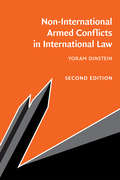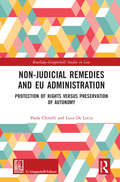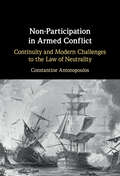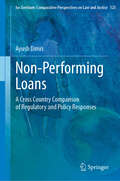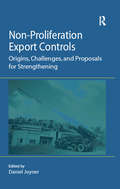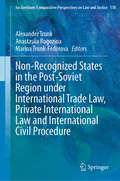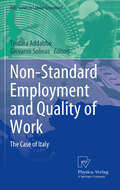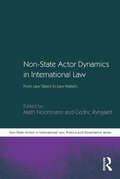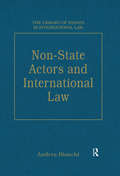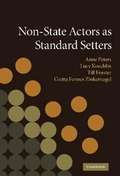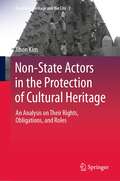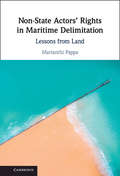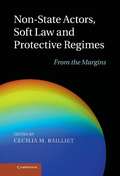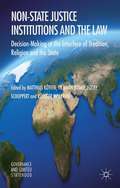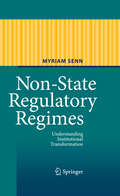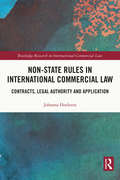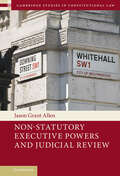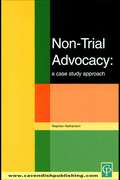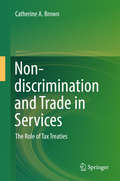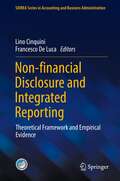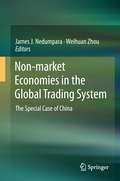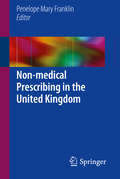- Table View
- List View
Non-International Armed Conflicts in International Law
by Yoram DinsteinThis dispassionate analysis of the legal implications of non-international armed conflicts explores the rules regulating the conduct of internal hostilities, as well as the consequences of intervention by foreign States, the role of the Security Council, the effects of recognition, State responsibility for wrongdoing by both Governments and insurgents, the interface with the law of human rights and the notion of war crimes. The author addresses both conceptual and specific issues, such as the complexities of 'failing' States or the recruitment and use of child soldiers. He makes use of the extensive case law of international courts and tribunals, in order to identify and set out customary international law. Much attention is also given to the contents of available treaty texts (primarily, the Geneva Conventions, Additional Protocol II and the Rome Statute of the International Criminal Court): what they contain and what they omit.
Non-International Armed Conflicts in International Law
by Yoram DinsteinThis dispassionate analysis of the legal implications of non-international armed conflicts explores the rules regulating the conduct of internal hostilities, as well as the consequences of intervention by foreign States, the role of the UN Security Council, the effects of recognition, State responsibility for wrongdoing by both Governments and insurgents, the interface with the law of human rights and the notion of war crimes. The author addresses both conceptual and specific issues, such as the complexities of 'failing' States or the recruitment and use of child soldiers. He makes use of the extensive case law of international courts and tribunals, in order to identify and set out customary international law. Much attention is also given to the contents of available treaty texts. This new updated edition takes into account the latest events in terms of the practice of States, judicial pronouncements and UN Security Council resolutions.
Non-Judicial Remedies and EU Administration: Protection of Rights versus Preservation of Autonomy (Routledge-Giappichelli Studies in Law)
by Paola Chirulli Luca De LuciaThe increasing number of executive tasks assigned to EU institutions and agencies has resulted in a greater demand for justice that can no longer be satisfied by the courts alone. This has led to the development of a wide range of administrative remedies that have become a central part of the EU administrative justice system. This book examines the important theoretical and practical issues raised by this phenomenon. The work focuses on five administrative remedies: internal review; administrative appeals to the Commission against decisions of executive and decentralised agencies; independent administrative review of decisions of decentralised agencies; complaints to the EU Ombudsman; and complaints to the EU Data Protection Supervisor. The research rests on the idea that there is a complex, and at times ambivalent, relationship between administrative remedies and the varying degrees of autonomy of EU institutions and bodies, offices and agencies. The work draws on legislation, internal rules of executive bodies, administrative practices and specific case law, data and statistics. This empirical approach helps to unveil the true dynamics present within these procedures and demonstrates that whilst administrative remedies may improve the relationship between individuals and the EU administration, their interplay with administrative autonomy might lead to a risk of fragmentation and incoherence in the EU administrative justice system.
Non-Legality in International Law
by Fleur JohnsInternational lawyers typically start with the legal. What is a legal as opposed to a political question? How should international law adapt to the unforeseen? These are the routes by which international lawyers typically reason. This book begins, instead, with the non-legal. In a series of case studies, Fleur Johns examines what international lawyers cast outside or against law - as extra-legal, illegal, pre-legal or otherwise non-legal - and how this comes to shape political possibility. Non-legality is not merely the remainder of regulatory action. It is a key structuring device of contemporary global order. Constructions of non-legality are pivotal to debate in areas ranging from torture to foreign investment and from climate change to natural disaster relief. Understandings of non-legality inform what international lawyers today do and what they refrain from doing. Tracing and potentially reimagining the non-legal in international legal work is, accordingly, both vital and pressing.
Non-Participation in Armed Conflict: Continuity and Modern Challenges to the Law of Neutrality
by Constantine AntonopoulosNon participation in armed conflict gives rise to the relevance, role and content of the law of neutrality in contemporary international law. Despite scholarly opinion to the contrary the challenges posed by collective security and the prohibition of the use of force have not made neutrality obsolete. The validity of the law of neutrality is reaffirmed in State practice, mainly in the form of national military manuals, and the case-law of international tribunals. The legal framework of neutrality remains unchanged with respect to most rules. At the same time, it has been adapted to the evolution of the law of the sea as a result of the 1982 UN Law of the Sea Convention, the globalization of trade and the use of cyberspace in armed conflict. This has been achieved mainly through soft law documents and national military manuals. Neutrality, however, remains inapplicable in non-international armed conflict.
Non-Performing Loans: A Cross Country Comparison of Regulatory and Policy Responses (Ius Gentium: Comparative Perspectives on Law and Justice #125)
by Ayush DimriThis book focuses on the regulatory, supervisory and policy resolutions of the problems of the financial and banking system during the global financial crisis and the COVID-19 pandemic. Many banks around the globe failed due to a bubble in the real estate sector, which was created in the US and rapidly spread around the world, producing a massive liquidity crunch. As a result, the proportion of non-performing loans (NPLs) rose in developed and emerging nations alike. This book critically examines the impact of the macroeconomic and microeconomic determinants that positively and negatively impact NPLs. The book offers a comparative analysis of initiatives taken in the UK, India, and Ireland. It examines the regulatory, supervisory, and policy-related measures adopted by these jurisdictions at the macro and micro levels, concluding that these measures alone will not suffice to reduce the proportion of NPLs due to the ever-evolving nature of the financial sector, mainly due to the excessive use of new technology that led to the evolution of new payment methods in the banking business in the recent time. It also shows how these jurisdictions mitigated various issues that emerged due to the COVID-19 pandemic and proposes corresponding measures, which mainly focus on applying new policy and regulatory interventions and structural changes in the institutional framework to address the problem of NPLs more effectively and avoid future downturns.
Non-Proliferation Export Controls: Origins, Challenges, and Proposals for Strengthening
by Daniel JoynerThis volume provides a comprehensive and interdisciplinary examination of the Multilateral Non-Proliferation Export Control system and the national and international context within which it functions. Key features: "
Non-Recognized States in the Post-Soviet Region under International Trade Law, Private International Law and International Civil Procedure (Ius Gentium: Comparative Perspectives on Law and Justice #118)
by Alexander Trunk Anastasiia Rogozina Marina Trunk-FedorovaNon-recognized States are a widespread and politically sensitive de facto phenomenon in international politics, raising numerous questions from both a public international law and private law perspective. The present book deals with rarely analysed questions on how States deal with legal issues of private law arising with regard to non-recognized States and what issues of international trade and investment law arise in such cases. The book takes the non-recognized States that emerged in the post-Soviet area after 1990/1991 as examples, but also makes references to other non-recognized States. The book is written from a comparative perspective, giving room to authors from various States and non-recognized States (state-like entities) alike. Recent developments have led to the disappearance of three non-recognized States in the region. In this regard, the book may also be interesting as a source of information that has already disappeared or will probably soon disappear from the Internet. Further, the book is highly relevant for the remaining non-recognized States in the region, while also offering a source of inspiration for private law (including civil procedure) and investment law aspects concerning non-recognized States in general.
Non-Standard Employment and Quality of Work
by Tindara Addabbo Giovanni SolinasThe international literature on non-standard employment has mostly focussed on its impact on employment, and more recently on working and living conditions. This volume explores these issues with special reference to Italy. Italy is characterized by very low participation rates (particularly women's), a high degree of fragmentation of labour contracts and a very intense non-standard work diffusion that make this context a particularly interesting case for analysis. New elements of discussion are provided with reference to the interaction of non-standard work, employment probability and living conditions. Interesting insights on the impact of non-standard work on the transition to stable employment and workers' careers emerge, suggesting a possible failure of companies' internal systems of work evaluation. The effects on labour productivity and on companies' performance are analysed. Within this framework, a new perspective on quality of work is suggested.
Non-State Actor Dynamics in International Law: From Law-Takers to Law-Makers (Non-State Actors in International Law, Politics and Governance Series)
by Cedric RyngaertNon-state actors have always been treated with ambivalence in the works of international law. While their empirical existence is widely acknowledged and their impact and influence uncontested, non-state actors are still not in the centre of international legal research. The idea that non-state actors are not law-makers, however, stands in sharp contrast with the growing notion of non-state actors as law-takers. This book examines the position of non-state actors in international law as law-makers and law-takers and questions whether these different positions can or should be separated from each other. Each contribution reveals both the political and normative aspects of the question as well as the positivistic possibilities and constraints to accommodate non-state actors as law-takers and law-makers in the contemporary international legal system. Altogether, each expert reveals that the position of non-state actors in international law is not a fixed one but changes with the functional and theoretical perspectives of the observer. Non-State Actor Dynamics in International Law is a welcomed addition to an under researched field of legal study. An indispensable read to scholars and policy makers wishing to gain new insights into general discourse on non-state actors in international law and the process of norm formation in the international realm.
Non-State Actors and International Law (The Library of Essays in International Law)
by Andrea BianchiThe expression 'non-state actors' has become part and parcel of the common parlance of international lawyers. Together with the traditional subjects of international law, such as states and international organizations, non-state actors play an important role in international law-making, law-adjudication and law-enforcement processes. Although the subjects/actors discourse takes place in a variety of contexts, most of the time the relevant narrative merely describes how different actors participate in the legal process in any given area. Little attention has been drawn to the theoretical discourse about non-state actors and its relation to the doctrine of the subjects of international law. Whether the solution lies in 'relativizing' the subjects or rather in 'subjectivizing' the actors remains open to doubt. The constant swing of the pendulum from the normative to the descriptive mesmerizes the observer but hardly hides the struggle for determining who may legitimately and authoritatively perform legally relevant acts on the international scene.
Non-State Actors as Standard Setters
by Anne Peters Lucy Koechlin Till Förster Gretta Fenner ZinkernagelThis analysis of 'globalised' standard-setting processes draws together insights from law, political sciences, sociology and social anthropology to assess the authority and accountability of non-state actors and the legitimacy and effectiveness of the processes. The essays offer new understandings of current governance problems, including environmental and financial standards, rules for military contractors and complex public-private partnerships, such as those intended to protect critical information infrastructure. The contributions also evaluate multi-stakeholder initiatives (such as the Extractive Industries Transparency Initiative), and discuss the constitution of public norms in stateless areas. A synopsis of the latest results of the World Governance Indicator, arguably one of the most important surveys in the area today, is included.
Non-State Actors in the Protection of Cultural Heritage: An Analysis on Their Rights, Obligations, and Roles (Creativity, Heritage and the City #3)
by Jihon KimThis book provides a comprehensive overview of international cultural heritage law from the perspectives of non-state actors (NSAs). In keeping with the significant developments concerning the status and roles of NSAs in international law over the last century, NSAs such as communities, experts, NGOs, and international organizations have become important participants in the implementation of international cultural heritage conventions. Indeed, due to the emergence of new ideas on common heritage and cultural rights in the 20th century, international cultural heritage law has become inconsistent with States’ claim to sole authority regarding the protection of cultural heritage. The author analyzes the texts of international cultural heritage conventions, as well as their operational texts, to track essential changes in the rights, obligations, and roles of NSAs since the mid-20th century. Practical cases on the status and roles of NSAs are introduced to glean empirical ideas and facilitate an in-depth understanding of their effectiveness. The analysis reveals that NSAs do have certain rights and responsibilities concerning the implementation of cultural heritage conventions, and their roles have been increasingly recognized. At the same time, however, discrepancies between text and practice can be observed when it comes to the status and roles of NSAs. They have emerged for various reasons, one of which is the politicization of conventions’ governance. Adopting the standpoint of the NSAs, the book emphasizes the need to explore innovative and practical mechanisms that will allow NSAs to attain their proper status and take on practical roles under international cultural heritage law, which will in turn ensure the sustainable protection of cultural heritage. This message becomes more pertinent to the current conflicts where various tensions between states and NSAs have arisen and the roles of NSAs have become more important.Given its scope, the book will be of special interest to students, researchers and professionals at government and non-government organizations in the fields of heritage, the arts, law, administration, and development.
Non-State Actors' Rights in Maritime Delimitation: Lessons from Land
by Marianthi PappaMost of the world's maritime boundary disputes involve privately held rights - relating to such matters as fishing, petroleum exploration and scientific research - that states have unilaterally granted to non-state actors in areas of overlapping national claims. An international lawyer would typically investigate the legality of a state's decision to create such rights without notifying or consulting its neighbour, and the legal consequences this action would have for the interests of the states concerned. Departing from this approach, Dr Marianthi Pappa examines such situations from the perspective of the non-state actors: what will happen to private rights in a disputed maritime area if it changes hands from state A to state B due to a subsequent delimitation treaty or judgment? Does the legal framework of maritime delimitation protect those rights effectively against a potential reallocation? To address these questions, the book considers the place that private rights have in land boundary-making.
Non-State Actors, Soft Law and Protective Regimes: From the Margins
by Cecilia M. BaillietBy offering critical perspectives of normative developments within international law, this volume of essays unites academics from various disciplines to address concerns regarding the interpretation and application of international law in context. The authors present common challenges within international criminal law, human rights, environmental law and trade law, and point to unintended risks and consequences, in particular for vulnerable interests such as women and the environment. Omissions within normative or institutional frameworks are highlighted and the importance of addressing accountability of state and non-state actors for violations or regressions of minimum protection guarantees is underscored. Overall, it advocates harmonisation over fragmentation, pursuant to the aspiration of asserting the interests of our collective humanity without necessarily advocating an international constitutional order.
Non-State Justice Institutions and the Law
by Matthias K�tter Tilmann J. R�der Gunnar Folke Schuppert R�diger WolfrumThis book focuses on decision-making by non-state justice institutions at the interface of traditional, religious, and state laws. The authors discuss the implications of non-state justice for the rule of law, presenting case studies on traditional councils and courts in Pakistan, South Sudan, Ethiopia, Bolivia and South Africa.
Non-State Regulatory Regimes
by Myriam SennNon-State Regulatory Regimes explores how the concept of regulation continues to evolve. The focus is placed on those forms of regulation that are different from state regulation or present alternatives to state regulation. Departing from an analysis of the goals and policies of the traditional regulatory state, the emergence of 'regulation by other means' is examined. The approach is interdisciplinary encompassing various perspectives be they legal, political, international relations-based, economic, or sociological. The task of comprehending non-state regulation is a daunting one. To date, a number of essays already exist, which concentrate on specific aspects of the issue. In comparison to these essays, this study is innovative in that it applies a holistic view. Linking public policy approaches to regulation, it draws a theoretical path to understanding the emergence and persistence of non-state jurisdictional assertions and regulatory regimes.
Non-State Rules in International Commercial Law: Contracts, Legal Authority and Application (Routledge Research in International Commercial Law)
by Johanna HoekstraThrough further technological development and increased globalization, conducting busines abroad has become easier, especially for Small and Medium Enterprises (SME). However, the legal issues associated with international commerce have not lessened in complexity, including the role of non-state rules. The book provides a comprehensive analysis of non-state rules in international commercial contracts. Non-state rules have legal authority in the national and international sphere, but the key question is how this legal authority can be understood and established. To answer this question this book examines first what non-state rules are and how their legal authority can be measured, it then analyses how non-state rules are applied in different scenarios, including as the applicable law, as a source of law, or to interpret either the law or the contract. Throughout this analysis three other important questions are also answered: when can non-state rules be applied? when are they applied? and how are they applied? The book concludes with a framework and classification that leads to a deeper understanding of the legal authority of non-state rules. Providing a transnational perspective on this important topic, this book will appeal to anyone researching international commercial law. It will also be a valuable resource for arbitrators and anyone working in international commercial litigation.
Non-Statutory Executive Powers and Judicial Review (Cambridge Studies in Constitutional Law #36)
by Jason Grant AllenThat non-statutory executive powers are subject to judicial review is beyond doubt. But current judicial practice challenges prevailing theories of judicial review and raises a host of questions about the nature of official power and action. This is particularly the case for official powers not associated with the Royal Prerogative, which have been argued to comprise a “third source” of governmental authority. Looking at non-statutory powers directly, rather than incidentally, stirs up the intense but ultimately inconclusive debate about the conceptual basis of judicial review in English law. This provocative book argues that modern judges and scholars have neglected the very concepts necessary to understand the supervisory jurisdiction and that the law has become more complex than it needs to be. If we start from the concept of office and official action, rather than grand ideas about parliamentary sovereignty and the courts, the central questions answer themselves.
Non-Trial Advocacy
by Stephen NathansonLawyers use non-trial advocacy skills in court for pre- and post-trial submissions. They are easier to learn than trial advocacy skills, and are much more relevant to the work of most new lawyers. This book examines all key aspects of criminal and civil non-trial advocacy, including bail applications, pleas in mitigation and interim applications made during the course of civil actions. Readers will learn the strategies and techniques of non-trial advocacy through seven realistic case studies: the lawyers involved discuss their strategies and deliver their arguments; the judge makes a decision; and the strengths and weaknesses of the arguments are then analyzed. With this innovative, case study approach to teaching advocacy skills, Non-Trial Advocacy provides an insight into how lawyers think and how they translate their strategies into courtroom action. The book concludes with a discussion of ethical conflicts involved in the practice of advocacy and how these affect the quality of lawyers' work in this field.
Non-consensual Image-based Sexual Offending: Bridging Legal and Psychological Perspectives (Palgrave Studies in Cyberpsychology)
by Craig A. Harper Dean FidoThis book presents a timely analysis of the psychological influences, underpinnings, and predictors of non-consensual image-based sexual offending (NCIBSO), such as revenge pornography, cyber-flashing, deepfake media production and upskirting. In this rapidly expanding field, this book offers a novel perspective that encompasses both a forensic psychoanalytic analysis of offending behaviours and an examination of the influence of our use of online environments and digital platforms on these behaviours. The authors begin by outlining the historical and legal context before moving on to a critique of previously posited motivating factors. Rather than conceptualising NCIBSO in purely gendered terms, they demonstrate the potential for a psychological framework to facilitate a better understanding of how and why people engage in a range of non-consensual sexual image offences. In doing so it will provide fresh insights for policymakers and clinicians, in addition to scholars from across the fields of psychology, sociology, criminology, law, media and gender studies.
Non-discrimination and Trade in Services
by Catherine A. BrownThis book argues that the proliferation of global trade and the increasing power of free trade arrangements leave income taxes as one of the few remaining measures that can potentially be used for protectionist purposes. It analyzes the interaction between the non-discrimination principles in tax treaties and trade-related agreements including multilateral (WTO), regional (NAFTA, AANZTA) and bilateral free trade agreements. The absence of a non-discrimination obligation with respect to tax measures that apply to non-resident service providers and to non-resident services may, therefore, significantly undermine trade obligations. The book clearly reveals how these tax barriers to trade may unfairly or unnecessarily restrict trade in services, and puts forward a new, more effective non-discrimination obligation in tax matters to be included in tax treaties, one that would more closely parallel the non-discrimination obligations in trade agreements. The book examines the concept of non-discrimination in tax matters from several perspectives, specifically a North American and Australian perspective, as well as a perspective based on EU (and UK) law, focusing on the interaction between these legal systems, bilateral tax treaties, regional trade agreements and, where relevant, the General Agreement on Trade in Services (GATS). The book explores the possibility of a reciprocal influence between tax treaties and trade agreements, and poses the question as to whether tax treaties might do more in providing a non-discrimination principle in the cross-border trade in services.
Non-financial Disclosure and Integrated Reporting: Theoretical Framework and Empirical Evidence (SIDREA Series in Accounting and Business Administration)
by Lino Cinquini Francesco De LucaThe increasingly crucial role of companies’ non-financial disclosure (NFD) and integrated reporting (IR) has led to a lively debate among academics, practitioners, and regulators on the approaches, framework, contents, principles, and standards that should oversee these forms of reporting. Through several expert contributions, conducted both with qualitative and quantitative methodologies, this book provides an up-to-date portrait of the debate by exploring corporate NFD either in its mandated contents or voluntary information. Contributing authors provide studies that encompass the different lines of NFD, namely non-financial risk reporting, sustainability reporting, and intellectual capital reporting, as well as the integration of financial and non-financial information through IR, the assurance of the NFD and IR through auditing activities, and the role of management and CFOs in NFD and IR.
Non-market Economies in the Global Trading System: The Special Case of China
by James J. Nedumpara Weihuan ZhouThis book provides one of the most comprehensive and compelling analysis of Non-Market Economies (NMEs) and their treatment under the current world trading system. In particular, it examines the treatment of China as an NME in anti-dumping investigations, especially post-December 2016. Central to this analysis is Section 15 of China’s Protocol of Accession to the WTO, which is the focal point of the controversy between China and other major WTO Members. The book highlights multiple perspectives on the interpretation of Section 15 and the Second Ad Note to Article VI of the General Agreement on Tariffs and Trade (GATT), which form the legal basis for China’s special treatment in anti-dumping proceedings, and provides unique approaches on interpreting the above treaty texts. In addition, the book explores recourses to trade remedy instruments other than anti-dumping to identify and address state-driven market distortions in the case of NMEs. Authored by leading practitioners and scholars, the chapters offer a detailed commentary and rich insights into the diverse approaches and methods used by anti-dumping investigation agencies of leading users. This book serves as an all-inclusive resource for discerning all facets of this issue, magnitude of the consequences, and potential threats to the delicate trading system. It is of particular relevance to economies-in-transition and newly acceding countries to the WTO. This book generates special interest among legal practitioners, exporters, trading firms, think tanks, academicians, policy makers and the entire community engaged in international trade disputes with China.
Non-medical Prescribing in the United Kingdom
by Penelope Mary FranklinThis book explores key developments in Non-medical Prescribing in the UK. Addressing the needs of countries in the European Market and beyond, which have been closely watching UK developments and would be interested in embedding or developing counterparts of their own. Featuring chapters by clinicians, leaders and practitioners in the UK Non-medical Prescribing arena, it identifies both current and potential future developments. Attention is paid to the different prescribing practices and governance within the four countries constituting the United Kingdom. Many lessons have been learned along the way and the purpose of this book is to share these lessons, tog ether with best practice examples in connection with the implementation of nurse/health professional led patient care, implementation of patient centered practice, and governance. Designated Registered Practitioners who have completed an enhanced training now receive a professional body qualification which enables them to prescribe within their scope of practice as Non-medical Independent Prescribers and, providing that they are competent, from anywhere within the British National Formulary independently of doctors; for Nurses, this also includes most controlled drugs. The book will be of interest to policy makers and to forward-looking professionals and practitioners in the diverse European Healt h and Social Care market.

